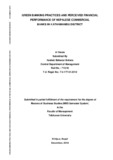Please use this identifier to cite or link to this item:
https://elibrary.tucl.edu.np/handle/123456789/1098| Title: | Green Banking Practices and Perceived Financial Performance of Nepalese Commercial Banks in Kathamandu District |
| Authors: | Bohora, Keshav Bahadur |
| Keywords: | Banking;Commercial banks;Green Investment,;Green Product and Service. |
| Issue Date: | 2018 |
| Publisher: | Central Department of Management |
| Abstract: | In today’s society, climate change is a most complicated issue. Nowadays, people are more conversant with global warming and its inherent consequences on human life. It is the matter of concern for the government and the direct polluters and also for other stakeholders like financial institutions. This includes banks, which are playing a fundamental role in the development of the society. Although banking activities are not physically related to the environment, yet it is an external impact of the customers which is substantial for them. To reduce the carbon footprint from the environment substantially, it is required by banks to promote those products, process and technology which adhere to it. Therefore, banks are adopting green strategies into their buildings, operations, and investments and financing strategies. The concept of Green Banking or Ethical Banking or Green initiatives taken by banks aims to protect the environment by means of promoting environmental-friendly practices and reducing the carbon footprint from banking activities. Environmental friendly practices include introduction of Green Products and Services, namely, Online Banking, Mobile Banking, Banking through ATMs, Green Deposits, Green Mortgages and Loans, Green Credit Cards, and Green Reward Checking Accounts. Banks can reduce their carbon footprints by adopting the certain measures like paperless banking, energy consciousness, using mass transportation system and use of solar and wind energy. The present study is aimed at determining the benefits of Green Banking, and assessing the awareness and perception of customers and bank employees regarding Green Banking in Kathamandu Nepal. In order to achieve this aim, this study is carried out in kathamandu Nepal, and on the six banks of Kathamandu that is, GME, NIC, SBI, NMB, ADBL and RBB. A sample of 300employees is selected to determine the awareness and perception of employees and bank customers towards Green Banking practice. Primary data is collected through a questionnaire while the secondary data is collected through various books and journals. The collected data is analyzed by applying both qualitative and quantitative data analysis techniques. The study concludes that the customers of the banks are not fully aware of the Green Banking products and services. However, most of the bank's employees are totally aware of the Green Banking service and its products. Moreover, the customers of the banks feel insecure in availing Green Banking services because of the security issues and fear of getting their private information misused. |
| URI: | http://elibrary.tucl.edu.np/handle/123456789/1098 |
| Appears in Collections: | Finance |
Files in This Item:
| File | Description | Size | Format | |
|---|---|---|---|---|
| Full Merge.pdf | 319.89 kB | Adobe PDF |  View/Open |
Items in DSpace are protected by copyright, with all rights reserved, unless otherwise indicated.
